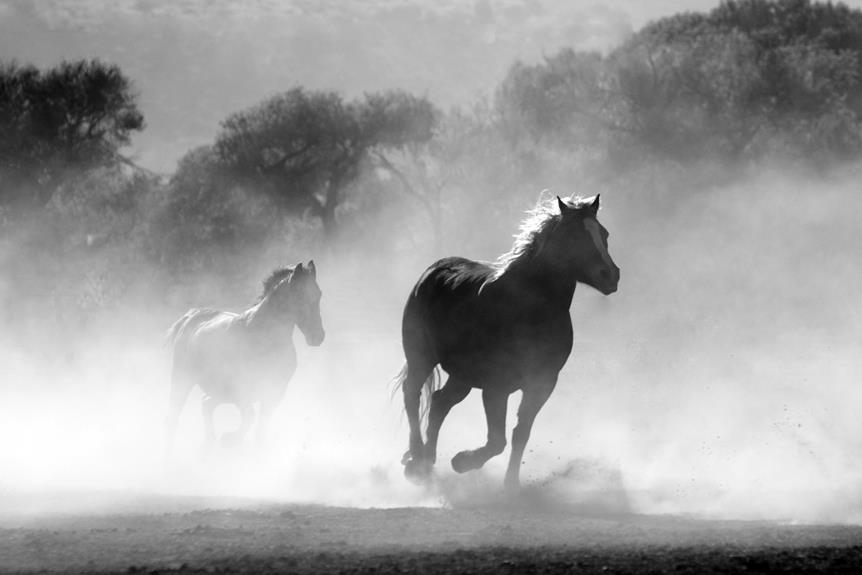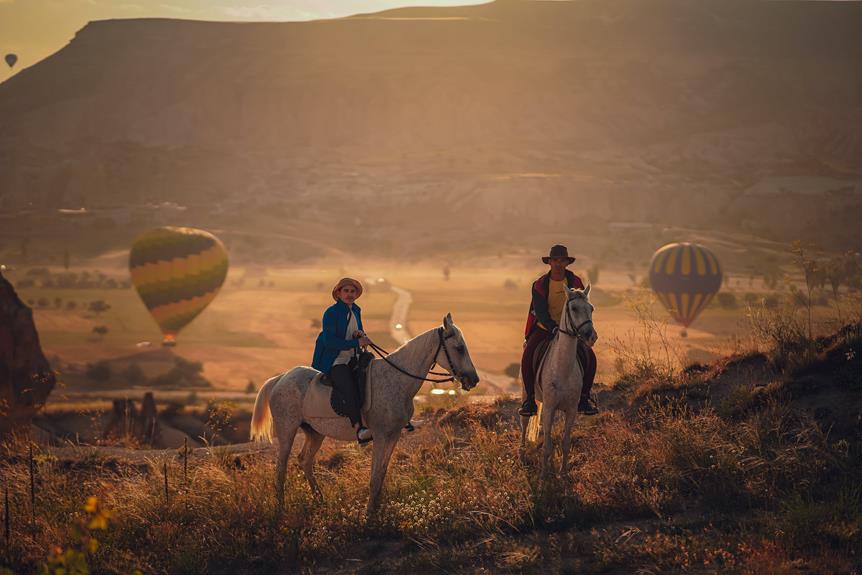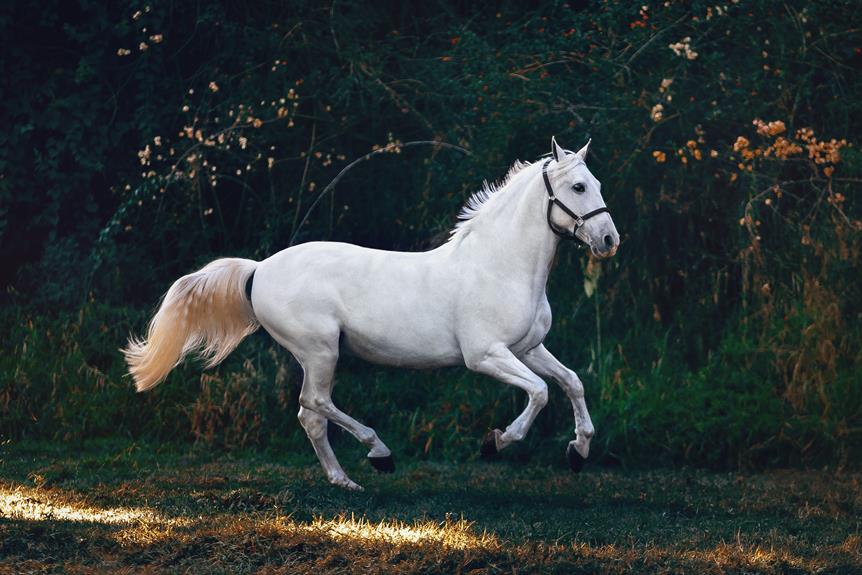Imagine yourself on a sunny day, perched upon a horse, the wind gently tousling your hair as you embark on your equestrian journey.
But wait, before you saddle up, it's essential to consider the worst horse breeds for beginners. These breeds possess traits that can make the riding experience quite challenging and potentially dangerous for those who are inexperienced.
From their spirited nature to their imposing size, the wrong choice of horse can turn a dream into a nightmare.
So, let's explore which breeds you should approach with caution, for your own safety and the horse's well-being.
Key Takeaways
- Arabian horses can be challenging for beginners due to their stubborn and hot-blooded nature, as well as potential health problems.
- Shire horses may overwhelm beginners with their imposing size and presence, making them difficult to control and mount.
- Faroese horses are not recommended for beginners due to their strong and independent temperament, requiring an experienced hand for training.
- Hanoverian horses, known for their large stature and athleticism, can be demanding for beginners to control and ride due to their energy requirements.
Arabian
If you're a beginner, it's best to approach Arabians with caution due to their challenging temperament and the need for skilled handling. Arabian horses are known for their intelligence and quick learning abilities, but this intelligence can also make them stubborn and prone to developing bad habits. They're considered hot-blooded horses, meaning they've a spirited and fiery nature. This breed of horse requires extensive training and experience to manage effectively. Their size alone can be intimidating for beginners, as they tend to be smaller in stature compared to other breeds.
Arabians aren't recommended as a beginners horse due to their spirited nature and potential for unpredictability. They can be easily spooked, making them unsuitable for inexperienced riders. Additionally, their stubborn nature can make them challenging to handle for someone without previous riding experience. It's important to note that Arabian horses require skilled handling to prevent any potential aggression or dangerous behavior.
In addition to their temperament, Arabian horses are also known to have certain health problems. They can be prone to conditions such as colic and metabolic disorders. It's crucial for beginners to have a good understanding of horse care and health management to properly care for an Arabian horse.
Shire
Shire horses, with their imposing size and presence, can be particularly overwhelming for beginners. This breed is known for its massive frame, which can make handling and riding them a challenge for novice riders. Shire horses aren't recommended for beginners due to their size and strength, as they can be difficult to control, especially for those who are new to horseback riding.
Mounting and dismounting a Shire horse can be especially tricky for beginners. Their height and weight make it harder to get on and off the saddle compared to smaller breeds. This can be intimidating and may cause fear or apprehension in inexperienced riders. If you're a beginner and are afraid of horses or have limited experience with larger animals, it's advisable to consider other breeds that are more suitable for beginners.
Before attempting to handle a Shire horse, it's recommended that beginners gain experience with smaller and more manageable breeds. This will allow you to develop the necessary skills and confidence needed to handle a horse of such size and power. Remember, it's important to prioritize your safety and choose a breed that matches your level of experience and comfort.
Faroese
The Faroese horse, known for its strength and endurance, can be a challenging breed for beginners to handle and train. Originating from the Faroe Islands over 1,000 years ago, these horses were introduced by Norse settlers and were traditionally used for farming and navigating the rugged terrain. However, the breed has faced a decline in population and is currently considered endangered due to modernization and changes in agricultural practices.
Faroese horses are known for their adaptability to harsh environments and their hardy nature. They possess a stubborn and independent temperament, which can make them difficult for inexperienced riders to handle. Their strong-willed nature often requires a firm and experienced hand during training and upbringing. While they excel in endurance and stamina, their challenging nature makes them less suitable for beginners seeking a gentle horse for riding.
To summarize, the Faroese horse is a breed with a rich history and exceptional strength and endurance. However, their independent temperament and challenging nature make them better suited for experienced riders rather than beginners. If you're new to horse riding, it's best to consider other breeds that are known for their gentleness and suitability for beginners.
Hanoverian
Hanoverians, with their large and powerful stature, can prove to be quite intimidating for beginners due to their size and strength. These horses excel in show jumping and dressage, requiring a fit and experienced rider to handle their agility and grace. Novice riders may find it challenging to control and sit to the Hanoverian's graceful movement.
Here are some reasons why beginners should avoid Hanoverians:
- Hanoverians are known for their athleticism, making them a demanding ride for beginners who may struggle to keep up with their energy and skill requirements.
- Due to their size, power, and specific skill demands, Hanoverians are generally not recommended for beginners.
On the other hand, Australian Brumbies are wild horses with a long history of roaming freely in Australia. These horses have adapted to their environment and are often more suitable for beginners. Australian Brumbies are known for their ability to take cues from trainers and are often gentle giants, making them a good choice for novice riders.
Unlike Hanoverians, Australian Brumbies are more forgiving and can provide a safe and enjoyable learning experience for beginners.
Thoroughbred
Thoroughbreds, with their high energy levels and hot-blooded nature, can be overwhelming for beginners to handle. These horses are most sought-after for horse racing and stud fees, but their strength, size, and endurance make them inappropriate for novice riders. Thoroughbreds require great skill and strength to control their behavior, making them challenging for beginners.
Novice riders may find it difficult to handle the intelligence and stubbornness of Thoroughbreds, which can lead to the development of bad habits. Although Thoroughbreds are amazing and perform well in the racing world, they may not be the best choice when buying your first horse. As a beginner, it's important to gain confidence and learn the basics of horse riding on a more suitable and forgiving breed.
Consider starting with a Warmblood horse or another good horse breed that can help you build your skills and gain confidence in the saddle. Remember, it's important to find a horse that matches your experience level and goals as a rider.
Frequently Asked Questions
What Is the Most Difficult Horse to Own?
The most difficult horse to own is one that is challenging for experienced riders. It requires essential skills in handling, managing high energy, overcoming fear, proper training, recognizing signs of stress, finding a suitable breed, and building a strong bond.
What Is the Best Horse Breed for a Beginner?
When choosing a horse breed for beginners, it's important to consider temperament, size, and energy level. Avoid breeds like Arabian or Thoroughbred that may be too challenging. Look for breeds like Quarter Horse or Haflinger known for their beginner-friendly nature.
What Is the Most Kid Friendly Horse Breed?
The top kid-friendly horse breeds for beginners are ones that are calm and gentle, like the Quarter Horse, Morgan, and Welsh Pony. Consider matching the horse's temperament with your child's personality for a harmonious partnership.
What Is the Most Aggressive Horse?
The most aggressive horse breed is subjective, but it's important to recognize signs of aggression in any horse. To handle an aggressive horse safely, seek professional guidance and use training techniques to manage their behavior. Understanding the causes and factors that contribute to aggression is key.
Conclusion
In conclusion, if you're a beginner in the world of horse riding, it's important to avoid breeds like Arabians, Thoroughbreds, Mustangs, and Akhal Tekes that have high energy levels and challenging behavior.
Additionally, larger breeds such as Shires, Percherons, Trakehners, Friesians, and Australian Brumbies should also be avoided due to their size and strength.
Instead, opt for horses that are calm, forgiving, and experienced with humans to ensure a safe and successful equestrian experience.



0 Comments